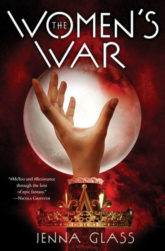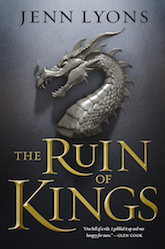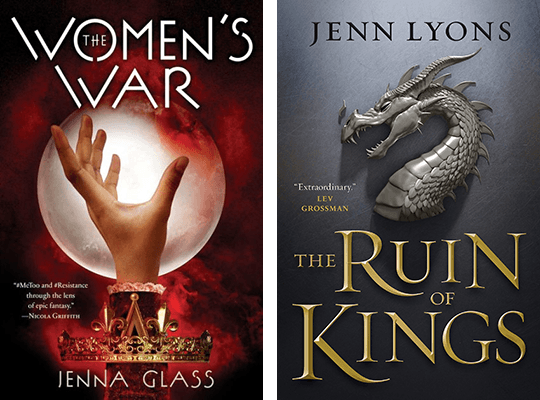Who doesn’t like epic fantasy? And feminist epic fantasy, at that?
The Women’s War by Jenna Glass and The Ruin of Kings by Jenn Lyons are both opening volumes in new epic fantasy series. I read them one after the other, and can’t help comparing their approaches to feminism—because both of them set themselves within oppressive societies. And yet, though The Women’s War spends more of its time with female main characters and sets itself amid a violent struggle for the liberation of (some) women in a rigidly patriarchal society, I found The Ruin of Kings more inclusive and more persuasive—more liberatory—in its approach to a patriarchal society.
Buy the Book


The Women’s War
The Women’s War stakes out its ground in a society divided by class as well as gender, and its arguments are quite simple: Discrimination against women on the basis of their gender is awful, patriarchy is terrible, and control over women’s reproduction is a contest that women have to win in order to have better lives. And yet, The Women’s War levels no critique at institutions of oppression other than patriarchy. Thus, by its focus on a single issue—an issue uncomplicated by the presence of trans people or even cisgender queer people—it gives the impression that sex-based discrimination is the only axis of oppression that matters.
If noble women can have the same status as their noble husbands, the same rights and responsibilities; if women can rule as queens with equal weight to kings and if men can no longer consign their wives to drudgery and misery by divorcing them; if rapists can be punished with impotence, it suggests, then there are no problems with a society ruled by queens and kings and aristocrats. No complicating factors that should be addressed, or other axes of oppression worth considering. The Women’s War may be feminist epic fantasy, but its feminism is the kind that never troubled to read Audre Lorde (for example).
The Ruin of Kings isn’t about sex-based discrimination in the same way as The Women’s War. Its female characters are all nuanced and competent, and sex-based discrimination is the least of their many problems—which involve ancient magical disasters and the possible end of the world, which is only partly of concern to the main protagonist and his revenge/justice quest—but the world in which they live and through which they move is shown as one where oppression operates on multiple (nationality, class, gender, sexual orientation) axes.
Buy the Book


The Ruin of Kings
One of the quiet points that The Ruin of Kings makes is that people can live, and be happy, and even thrive in societies that have terrible structures in them, and people who do awful things in some aspects of their lives can be kind in others—and that people can change and be better than they were. And one of the quiet questions that The Ruin of Kings poses is whether such a society is worth saving (trying to save) from prophesied destruction—and seems to incline at least a little towards the nope, build something better end of the spectrum. Oppression and social change in The Ruin of Kings feels realistically complicated—both personal and political, extending in multiple directions, including many permutations—and nuanced, even if the novel itself is focused on one young man’s intensely personal journey. (And a whole hell of a lot of cool shit worldbuilding.)
By the way, The Ruin of Kings almost does live up to its extravagant advance hype, guys, so if epic fantasy is your jam, you should definitely check this one out. (And there was a lot of extravagant advance hype, so almost living up to it still makes for a pretty damn good book.)
I find this more complicated approach to portraying a society ultimately more personally satisfying and to hold out more liberatory (and hopeful) possibilities, both in the real world and in fictional ones. It’s interesting to consider how much of our approach to the social world is shaped by the narratives we consume—by the patterns and models we’re shown that simplify a reality which, by virtue of its complications and sheer scale, is hard to grasp without those simplified models. What’s left out, as well as what’s included, remains important.
For fiction, as well as for reality.
Liz Bourke is a cranky queer person who reads books. She holds a Ph.D in Classics from Trinity College, Dublin. Her first book, Sleeping With Monsters, a collection of reviews and criticism, was published in 2017 by Aqueduct Press. It was a finalist for the 2018 Locus Awards and was nominated for a 2018 Hugo Award in Best Related Work. Find her at her blog, where she’s been known to talk about even more books thanks to her Patreon supporters. Or find her at her Twitter. She supports the work of the Irish Refugee Council, the Transgender Equality Network Ireland, and the Abortion Rights Campaign.










